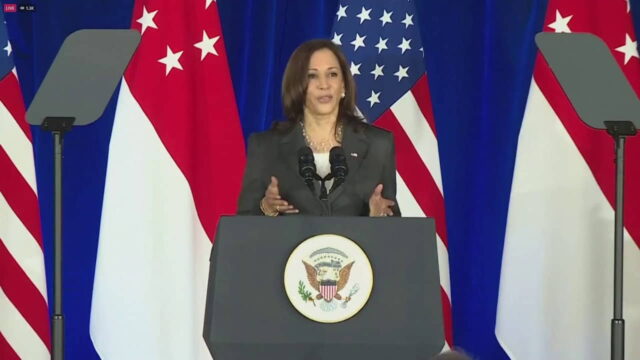NEW DELHI: At any other time, the first visit by US Vice President Kamala Harris to Singapore and Vietnam would have been seen as evidence of Washington’s commitment to a region under pressure from China. But in the aftermath of the bungled US withdrawal from Afghanistan, it’s not clear if Harris has been able to reassure friends or allies.
Former diplomat Deepa Gopalan Wadhwa agrees that the “credibility of the US is at an all-time low”. But to Harris’ credit, she didn’t shy away from the Afghan bungle during her visit. Praising President Biden for making the “courageous and right” decision to withdraw troops from Afghanistan, she claimed that the United States would continue to “advance its interests” in other regions.
“As the US addresses developments in one region we will continue to advance our interest in other regions – including this region,” she said in Singapore. “That is why our partnerships in Singapore, in Southeast Asia and the Indo-Pacific are the topmost priority for the US.”
Were her hosts convinced? The US record in Southeast Asia since former president Barack Obama’s much ballyhooed “pivot to Asia”, has little to show on the ground. Former US defence secretary Jim Mattis warned that Beijing’s strategy of “intimidation and coercion” would invite consequences, but little happened. Observers believe that Obama did little to check Chinese aggression in the South China Sea while Trump followed with an attitude of benign neglect. With the coming of the Biden regime there was hope things would change.
“Much has been made of China’s greater economic clout with the Asean countries than the US. But China has geographical proximity to these nations so that’s natural. It’s no holds barred diplomacy makes other countries uncomfortable so Vietnam and Singapore would certainly have seen the US’s overtures as something positive,” says Wadhwa.
Nevertheless, from the Asean perspective, the seeming cluelessness of the US would have raised alarm bells. Many of the Far Eastern nations were well prepared with Japan already having got its nationals out of Afghanistan. So, despite the fine words on strengthening multilateralism and bilateral ties and committing to the Indo-Pacific, observers believe that there will be a time of great reassessment where close attention will be paid by Asean nations as to how President Biden handles the Afghan crisis. The next few months are likely to be crucial.
The scrutiny and the possible “trust deficit” in the Biden’s administration’s ability to deliver is unfortunate as it come on the eve of the scheduled in-person Quad summit at the end of September. Here, South and Southeast Asia, considered to be the lynchpin of the Indo-Pacific strategy, would certainly be on the agenda. Creating strong value chains, improving distribution of Covid-19 vaccines, creating an enabling environment for US companies to invest in Asean nations and most importantly, dealing with climate change will be key.
A recent paper stated Asean countries are particularly vulnerable to environmental changes. For instance, rising sea levels would heavily impact “coastal cities such as Jakarta, Bangkok and Manila with millions of people having to be resettled and massive expenditures incurred to protect them.”
Biden’s focus on the environment and talk of investment and value chains is reassuring to Asean nations who remain fearful of becoming economically over-dependent on China through the BRI. But the US president needs to prove his mettle as a global leader first and Afghanistan is the crucial test.
Traveller, bibliophile and wordsmith with a yen for international relations. A journalist and budding author of short fiction, life is a daily struggle to uncover the latest breaking story while attempting to be Hemingway in the self-same time. Focussed especially on Europe and West Asia, discussing Brexit, the Iran crisis and all matters related is a passion that endures to this day. Believes firmly that life without the written word is a life best not lived. That’s me, Ashwin Ahmad.





